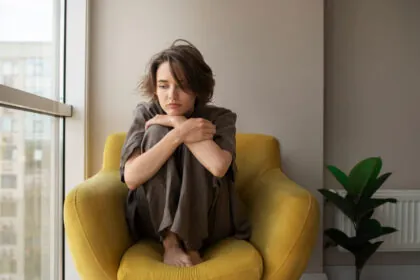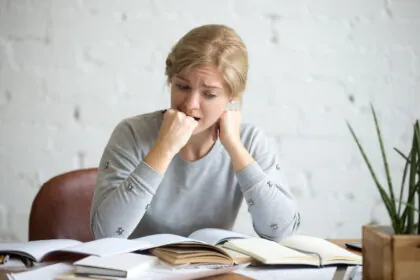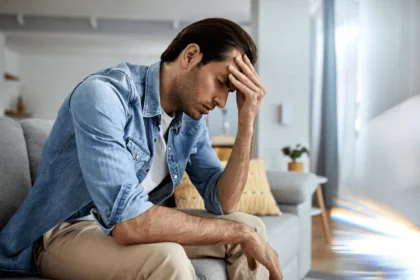Anxiety is a natural human response to stress or danger. It is a normal part of life and can serve as a helpful mechanism that prompts us to be alert and focused in challenging situations.
However, when anxiety becomes excessive, persistent, and interferes with daily life, it may be classified as an anxiety disorder.
Anxiety disorders are a group of mental health conditions characterized by excessive worry, fear, or apprehension.
Common symptoms of anxiety disorders include restlessness, muscle tension, fatigue, difficulty concentrating, irritability, sleep disturbances, and a heightened startle response.
Anxiety disorders can manifest in various forms, such as generalized anxiety disorder (GAD), panic disorder, social anxiety disorder, and specific phobias, among others.
The Struggle of being anxious
The experience of anxiety can be challenging and impactful on various aspects of a person’s life.
Individuals dealing with anxiety may face a range of struggles, both physical and emotional.
Here are some common aspects of the struggle associated with anxiety:
Intense Worry
Anxiety often involves excessive and uncontrollable worrying about future events, even if they are unlikely to happen.
This constant worry can be mentally exhausting and make it difficult to focus on the present.
Physical Symptoms
Anxiety is not just a mental health issue; it can also manifest physically. People may experience symptoms such as muscle tension, headaches, fatigue, sweating, trembling, and digestive issues.
These physical symptoms can contribute to discomfort and a sense of unease.
Social Challenges
Social situations can be particularly challenging for individuals with social anxiety.
Fear of judgment or negative evaluation may lead to avoidance of social interactions, which can impact relationships, work, and overall quality of life.
Sleep Disturbances
Anxiety often interferes with sleep. Individuals may have difficulty falling asleep, staying asleep, or experiencing restful sleep.
This lack of quality sleep can contribute to fatigue and exacerbate other anxiety symptoms.
Impact on Daily Functioning
Persistent anxiety can interfere with daily tasks and responsibilities.
It may affect work or academic performance, making it challenging to concentrate or make decisions. Simple activities may become overwhelming.
Isolation
Some individuals with anxiety may withdraw from social activities or isolate themselves as a way to cope with their fears.
This isolation can contribute to feelings of loneliness and exacerbate the impact of anxiety.
Physical Health Consequences
Long-term anxiety can have implications for physical health.
Chronic stress may contribute to conditions such as cardiovascular problems, digestive issues, and a weakened immune system.
Cycle of Fear and Avoidance
Anxiety can create a cycle of fear and avoidance.
The fear of certain situations or stimuli may lead to avoidance, but avoidance can reinforce the fear, making it more difficult to confront and overcome anxious feelings.
It’s important to recognize that the experience of anxiety can vary widely among individuals, and the impact on daily life can range from mild to severe.
If you prefer not to pursue therapy or medications for anxiety, there are several natural remedies and lifestyle changes that you may consider.
While these approaches may not replace professional treatment, they can complement self-care efforts and contribute to overall well-being.
It’s important to note that individual responses to these strategies can vary, and what works for one person may not work for another. Here are some natural remedies to consider:
Regular Exercise
Regular exercise has been shown to have positive effects on both physical and mental health, including the reduction of anxiety symptoms.
Here are some ways in which regular exercise can help relieve anxiety:
Release of Endorphins
Exercise stimulates the release of endorphins, which are chemicals in the brain that act as natural painkillers and mood elevators. Endorphins can contribute to a sense of well-being and help reduce anxiety.
Stress Reduction
Physical activity helps the body to better manage and reduce stress. Exercise can be a healthy outlet for the physiological changes that occur in response to stress, such as increased heart rate and muscle tension.
Improved Sleep
Regular exercise is associated with improved sleep quality. Better sleep can have a positive impact on mood and resilience to stress, contributing to a reduction in anxiety symptoms.
Neurotransmitter Regulation
Exercise can influence the levels of neurotransmitters in the brain, including serotonin, norepinephrine, and dopamine. These neurotransmitters play a role in mood regulation, and imbalances have been linked to anxiety disorders.
Distraction and Focus
Engaging in physical activity provides a distraction from anxious thoughts and helps redirect focus. This shift in attention can be a helpful strategy for managing anxiety in the moment.
Increased Confidence and Self-Esteem
Regular exercise can lead to improvements in physical fitness and appearance, which may boost confidence and self-esteem. Feeling more positive about oneself can contribute to a reduction in anxiety.
Social Interaction
Participating in group exercise activities or team sports can provide opportunities for social interaction and support. Social connections are important for overall mental health and can help alleviate feelings of isolation or loneliness.
Brain Plasticity and Cognitive Benefits
Exercise has been associated with improved cognitive function and increased brain plasticity. These cognitive benefits may contribute to better coping mechanisms and adaptive responses to stressors.
Routine and Structure
Establishing a regular exercise routine can provide a sense of structure and predictability in daily life. This can be especially beneficial for individuals who thrive on routine and struggle with uncertainty, a common trigger for anxiety.
It’s important to note that the type and intensity of exercise can vary based on individual preferences and physical health.
Before starting a new exercise regimen, it’s advisable to consult with a healthcare professional, especially if you have any pre-existing health conditions.
Additionally, finding forms of exercise that you enjoy can increase the likelihood of sticking with a routine over the long term.
Mindfulness and Relaxation Techniques
Mindfulness and relaxation techniques are therapeutic practices that focus on cultivating present-moment awareness and promoting a state of calmness.
These techniques can be effective in managing anxiety by helping individuals develop a non-judgmental and accepting attitude toward their thoughts and feelings.
Here’s how mindfulness and relaxation techniques can contribute to anxiety relief in detail:
Present-Moment Awareness
Mindfulness involves paying attention to the present moment without judgment.
Many anxiety-related thoughts and worries are centered around future events or past experiences.
By bringing attention to the present, individuals can reduce the impact of anxious thoughts and focus on the reality of the current moment.
Mindful Breathing
One of the fundamental practices in mindfulness is mindful breathing.
By focusing on the breath and observing its natural rhythm, individuals can create a sense of grounding and relaxation.
Deep, diaphragmatic breathing can activate the body’s relaxation response, reducing the physiological symptoms of anxiety.
Body Scan Meditation
Body scan meditation involves systematically bringing attention to different parts of the body, noticing sensations without judgment.
This practice promotes body awareness and relaxation, helping individuals identify and release tension.
Mindful Observation
Mindfulness encourages observing thoughts and emotions without becoming entangled in them.
This non-reactive awareness allows individuals to step back from anxious thoughts, view them objectively, and reduce their emotional impact.
Acceptance and Commitment Therapy (ACT)
ACT is a therapeutic approach that incorporates mindfulness to help individuals accept their thoughts and feelings rather than trying to suppress or control them.
This acceptance allows for a more flexible and adaptive response to anxiety.
Mindful Movement Practices
Activities such as yoga or tai chi integrate mindfulness with physical movement.
These practices promote relaxation, improve flexibility, and provide a focused, meditative experience that can help reduce anxiety.
Guided Imagery and Visualization
Visualization exercises involve creating mental images of peaceful and calming scenes.
By engaging the imagination in a positive way, individuals can shift their focus away from anxiety-inducing thoughts and create a sense of mental tranquility.
Progressive Muscle Relaxation (PMR)
PMR involves systematically tensing and then relaxing different muscle groups.
This practice helps release physical tension, promoting relaxation and a sense of calm.
Mindfulness-Based Stress Reduction (MBSR)
MBSR is a structured program that combines mindfulness meditation and yoga to promote stress reduction.
It has been shown to be effective in managing various forms of anxiety.
Cognitive Distance
Mindfulness encourages individuals to observe thoughts as passing events in the mind rather than absolute truths.
This cognitive distance can reduce the emotional intensity of anxious thoughts.
It’s important to note that developing mindfulness skills takes practice, and consistency is key.
Integrating these techniques into daily life can contribute to long-term anxiety management.
Healthy Diet
Maintaining a healthy diet can play a role in supporting mental health and potentially alleviating anxiety symptoms.
While a healthy diet alone may not be a substitute for professional treatment, it can contribute to overall well-being and complement other anxiety management strategies.
Here’s how a healthy diet may help with anxiety in detail:
Balanced Nutrient Intake
Consuming a well-balanced diet provides the body with essential nutrients, including vitamins and minerals, that are important for overall health.
Nutrient deficiencies can contribute to physical and mental health issues, including anxiety.
Serotonin Production
Serotonin is a neurotransmitter that plays a role in mood regulation.
Certain foods, such as those rich in tryptophan (an amino acid), can support the production of serotonin. Examples include turkey, chicken, nuts, seeds, and dairy products.
Omega-3 Fatty Acids
Omega-3 fatty acids, found in fatty fish (e.g., salmon, mackerel), flaxseeds, chia seeds, and walnuts, have been associated with positive effects on mood.
They may help regulate neurotransmitters and reduce inflammation, potentially benefiting individuals with anxiety.
Complex Carbohydrates
Complex carbohydrates, such as whole grains, fruits, and vegetables, provide a steady release of glucose into the bloodstream.
This helps maintain stable blood sugar levels, preventing energy crashes that can contribute to irritability and anxiety.
Probiotics and Gut Health
Emerging research suggests a link between gut health and mental health.
Probiotics, found in fermented foods like yogurt, sauerkraut, and kefir, may positively influence the gut microbiota and, in turn, impact mood and anxiety.
B Vitamins
B vitamins, including B6, B9 (folate), and B12, play a role in neurotransmitter synthesis and regulation.
Foods such as leafy green vegetables, legumes, whole grains, and lean meats are good sources of B vitamins.
Antioxidants
Antioxidant-rich foods, such as berries, dark chocolate, and colorful fruits and vegetables, help combat oxidative stress.
Oxidative stress has been linked to mental health issues, and antioxidants may have protective effects.
Limiting Caffeine and Sugar
High intake of caffeine and refined sugars can contribute to fluctuations in energy levels and may exacerbate anxiety symptoms.
Moderating the consumption of caffeinated beverages and sugary foods can help stabilize mood.
Hydration
Dehydration can negatively impact mood and cognitive function.
Staying adequately hydrated by drinking water throughout the day is essential for overall well-being.
Moderating Alcohol Intake
Excessive alcohol consumption can disrupt sleep patterns and contribute to feelings of anxiety.
Moderating alcohol intake or avoiding it altogether may be beneficial for individuals prone to anxiety.
Adequate Sleep
Adequate sleep is crucial for overall health, and it plays a significant role in both physical and mental well-being, including the management of anxiety.
Here’s how sufficient and quality sleep can help with anxiety:
Restoration of Neurotransmitters
During sleep, the brain has an opportunity to restore and regulate neurotransmitters, including serotonin and dopamine.
These neurotransmitters play a crucial role in mood regulation, and an imbalance can contribute to anxiety.
Stress Hormone Regulation
Sleep helps regulate the body’s stress response by influencing the release of stress hormones such as cortisol.
Chronic sleep deprivation can lead to an overactive stress response, making individuals more susceptible to anxiety.
Emotional Processing and Memory Consolidation
Sleep is essential for processing and consolidating emotional experiences and memories.
A lack of sleep may interfere with this process, potentially exacerbating emotional reactivity and anxiety.
Cognitive Function and Decision-Making
Adequate sleep is essential for cognitive function, including decision-making and problem-solving skills.
Sleep deprivation can impair these cognitive functions, making it more challenging to cope with stressors and manage anxiety effectively.
Reduced Irritability and Emotional Reactivity
Lack of sleep can contribute to increased irritability and heightened emotional reactivity.
Individuals who are well-rested are often better equipped to handle stressors and navigate challenging situations with greater emotional resilience.
Improved Concentration and Focus
Sleep plays a crucial role in maintaining attention, concentration, and focus.
A well-rested mind is better able to engage in tasks, make sound judgments, and respond to stressors in a more adaptive way.
Enhanced Stress Resilience
Quality sleep is associated with increased stress resilience.
When individuals consistently get sufficient sleep, they may be better equipped to face life’s challenges and are less likely to feel overwhelmed by stress, which can contribute to anxiety.
Physical Health Benefits
Chronic sleep deprivation is linked to various physical health issues, including cardiovascular problems and weakened immune function.
Poor physical health can contribute to an increased vulnerability to stress and anxiety.
Establishment of a Healthy Routine
Consistent sleep patterns contribute to the establishment of a healthy daily routine.
A structured routine can provide a sense of stability and predictability, which is beneficial for mental well-being.
Enhanced Problem-Solving Skills
Sleep is crucial for creative thinking and problem-solving.
Individuals who are well-rested are often better able to approach challenges with a clear and focused mind, reducing the likelihood of anxiety-related difficulties.
It’s important to prioritize good sleep hygiene practices, including maintaining a regular sleep schedule, creating a comfortable sleep environment, and avoiding stimulants like caffeine close to bedtime.
Herbal Remedies
Herbal remedies are substances derived from plants that are used for their potential therapeutic properties.
Some herbs have been studied for their effects on anxiety, and while research is ongoing, there is evidence to suggest that certain herbal remedies may offer relief for some individuals.
It’s important to note that herbal remedies are not a substitute for professional medical advice, and individuals should consult with a healthcare provider before incorporating them into their routine.
Here are some herbal remedies that have been explored for their potential benefits in managing anxiety:
CBD Oil (Cannabidiol)
CBD is a compound derived from the cannabis plant.
It has gained attention for its potential anxiolytic (anxiety-reducing) effects.
CBD interacts with the endocannabinoid system in the body, which plays a role in regulating mood and stress responses.
Some studies suggest that CBD may help reduce anxiety symptoms, but more research is needed to fully understand its efficacy and safety.
Passionflower (Passiflora incarnata)
Passionflower is an herb traditionally used for its calming properties.
Some studies have suggested that passionflower may be as effective as benzodiazepines in reducing anxiety symptoms.
It is believed to work by increasing levels of gamma-aminobutyric acid (GABA), a neurotransmitter that has calming effects.
Valerian Root (Valeriana officinalis)
Valerian root has been used for centuries as a natural remedy for anxiety and sleep disorders.
It is thought to enhance the effects of GABA, promoting relaxation and reducing anxiety.
Valerian is often used as a supplement or in herbal teas.
Lavender (Lavandula angustifolia)
Lavender is known for its calming and soothing properties.
Aromatherapy using lavender essential oil or ingesting lavender supplements has been studied for its potential to reduce anxiety. It may have a mild sedative effect.
Chamomile (Matricaria chamomilla)
Chamomile is often consumed as a tea and has been traditionally used to promote relaxation and reduce anxiety.
It contains compounds like apigenin that may interact with receptors in the brain to induce calming effects.
Kava Kava (Piper methysticum)
Kava kava is a plant native to the South Pacific, and its root extract has been used for its sedative and anxiolytic effects.
It may interact with GABA receptors in a manner similar to certain anti-anxiety medications.
However, its safety has been a subject of concern, and it may have adverse effects on the liver.
Rhodiola Rosea
Rhodiola is an adaptogenic herb that may help the body better respond to stress.
Some studies suggest that Rhodiola supplementation may reduce symptoms of generalized anxiety disorder and improve overall well-being.
Ashwagandha (Withania somnifera)
Ashwagandha is an adaptogenic herb with potential anxiolytic effects.
It may modulate the body’s stress response and reduce symptoms of anxiety. Research on ashwagandha for anxiety is ongoing.
It’s essential to approach herbal remedies with caution, as their safety, efficacy, and potential interactions with medications can vary.
Before trying herbal remedies for anxiety, individuals should consult with a healthcare professional, especially if they are taking other medications or have underlying health conditions.
Conclusion
Anxiety is a complex and multifaceted mental health condition that can significantly impact various aspects of an individual’s life.
Whether it manifests as occasional worry or a diagnosed anxiety disorder, the struggle with anxiety encompasses a range of challenges, including intense worry, physical symptoms, social difficulties, and disruptions to daily functioning.
Recognizing the nuances of anxiety and seeking appropriate support are crucial steps toward effective management.
For those who prefer non-pharmacological and non-therapeutic interventions, various natural remedies and lifestyle changes can contribute to anxiety relief.
Regular exercise, mindfulness and relaxation techniques, a healthy diet, adequate sleep, and social support are integral components of self-care that promote overall well-being and may positively influence anxiety symptoms.
These approaches focus on enhancing physical health, regulating neurotransmitters, and fostering emotional resilience.
Furthermore, the potential of herbal remedies, including CBD oil, has been explored in managing anxiety symptoms.
While research is ongoing, some herbs such as passionflower, valerian root, lavender, and chamomile have shown promise in promoting relaxation and reducing anxiety.
However, it’s essential to approach herbal remedies with caution, seeking guidance from healthcare professionals to ensure safety and avoid potential interactions with medications.
In navigating the complexities of anxiety, individuals are encouraged to adopt a holistic approach that considers their unique preferences, lifestyle, and the severity of their symptoms.
Seeking professional guidance from mental health professionals remains a pivotal step in accurately diagnosing and addressing anxiety.
Whether through therapy, medication, natural remedies, or a combination of approaches, the goal is to empower individuals to manage anxiety effectively and improve their overall quality of life.
FAQs
Can exercise really help with anxiety?
Yes, regular exercise has been shown to release endorphins, reduce stress hormones, and improve overall mood, contributing to anxiety relief.
How can mindfulness techniques assist in managing anxiety?
Mindfulness techniques promote present-moment awareness, reducing anxious thoughts and enhancing emotional resilience by fostering a non-judgmental mindset.
Are there natural remedies for anxiety besides medications?
Yes, natural remedies such as herbal supplements (e.g., passionflower, valerian root), a healthy diet, and adequate sleep can complement anxiety management strategies.
What role does sleep play in anxiety relief?
Adequate sleep restores neurotransmitters, regulates stress hormones, and enhances cognitive function, contributing to better stress resilience and reduced anxiety.
Is CBD oil effective for anxiety?
Some studies suggest potential anxiolytic effects of CBD oil, but more research is needed to fully understand its efficacy and safety in managing anxiety symptoms. Consultation with a healthcare professional is recommended





